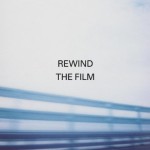By early Friday afternoon the rains had stopped and a pale sun was starting to poke its head through the dark clouds still circling over Worthy Farm. As if taking her cue from this change in the weather, Amanda Palmer decided that the time was right to kick-start this year’s Glastonbury festival. With their stage costumes lost somewhere in transit, Palmer and her Grand Theft Orchestra were literally stripped for action. Guitarist Chad Raines was down to his underpants and a silver cape; new drummer Thor, with whom they had apparently only practised for a total of five hours, didn’t even bother with the luxury of a cape. Palmer 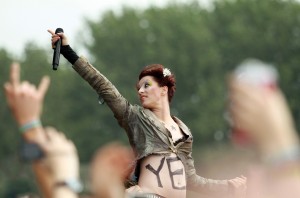 herself sported a white shirt which was soon to be slashed to her waist revealing an upper body daubed in black stars and a huge Yes scrawled across her abdomen. With the costumes, the band’s theatrical props had also gone west. As such Palmer’s performance was much more punk than cabaret. Robbed of much of its potential flamboyance and drama it became a far more concentrated, contagious fusion of rock and roll in which she and her four cohorts powered their way through a phenomenally energised set peppered with material from last year’s Kickstarter funded album Theatre of Fire, spirited covers of ‘Twist and Shout’ and ‘Common People’ and an inspired blast of The Dresden Dolls’ ‘Girl Anachronism’ before Palmer finally bowed out with a suitably maverick ‘Ukulele Anthem’. Amanda Palmer divides opinion. To many she is no more than a controversial, shameless, shameful egocentric, hell-bent on nothing more than self-publicity and self-aggrandisement, all the while masquerading under the name of art; here she emerged from underneath any such misconceptions to reveal herself, quite literally, as a bona-fide rock star.
herself sported a white shirt which was soon to be slashed to her waist revealing an upper body daubed in black stars and a huge Yes scrawled across her abdomen. With the costumes, the band’s theatrical props had also gone west. As such Palmer’s performance was much more punk than cabaret. Robbed of much of its potential flamboyance and drama it became a far more concentrated, contagious fusion of rock and roll in which she and her four cohorts powered their way through a phenomenally energised set peppered with material from last year’s Kickstarter funded album Theatre of Fire, spirited covers of ‘Twist and Shout’ and ‘Common People’ and an inspired blast of The Dresden Dolls’ ‘Girl Anachronism’ before Palmer finally bowed out with a suitably maverick ‘Ukulele Anthem’. Amanda Palmer divides opinion. To many she is no more than a controversial, shameless, shameful egocentric, hell-bent on nothing more than self-publicity and self-aggrandisement, all the while masquerading under the name of art; here she emerged from underneath any such misconceptions to reveal herself, quite literally, as a bona-fide rock star.
Trying to emerge from the shadows is also a concept with which Solange Knowles will be more than familiar. Much better known 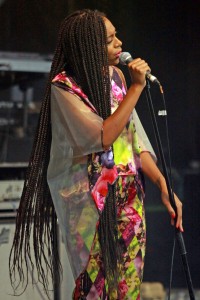 for being Beyonce’s younger sister than as an artist in her own right, she still chose to follow in her sibling’s footsteps to Glastonbury. Two years ago the older Knowles girl headlined the main stage; this time round it is the turn of the younger one, albeit taking the low road to an afternoon slot up on the Park Stage. Whilst the woozy groove of her alternative, indie take on RnB infused pop fitted perfectly with both the time and place, the absence of any real edge ensured that it was often equally lost within it. Big on hair-braids and presence Solange was going to savour her Glastonbury moment come what may and by the time she had meandered her way via the funky ‘Locked in Closets’ and The Dirty Projectors’ ‘Stillness in the Move’ to the valedictory ‘Losing You’ she seemed to have reached her very own point of festival self-actualisation.
for being Beyonce’s younger sister than as an artist in her own right, she still chose to follow in her sibling’s footsteps to Glastonbury. Two years ago the older Knowles girl headlined the main stage; this time round it is the turn of the younger one, albeit taking the low road to an afternoon slot up on the Park Stage. Whilst the woozy groove of her alternative, indie take on RnB infused pop fitted perfectly with both the time and place, the absence of any real edge ensured that it was often equally lost within it. Big on hair-braids and presence Solange was going to savour her Glastonbury moment come what may and by the time she had meandered her way via the funky ‘Locked in Closets’ and The Dirty Projectors’ ‘Stillness in the Move’ to the valedictory ‘Losing You’ she seemed to have reached her very own point of festival self-actualisation.
The enduring rock n roll marriage of Tina Weymouth and Chris Frantz also provided the exquisite engine that once powered the vehicle known as Talking Heads. Their side project Tom Tom Club took a branch line from their then day job and carried a powerful torch at the head of the early ‘80’s march towards synth-pop revolution. Their appearance on the West Holts stage is part of a wider European tour promoting their first album in twelve years, Downtown Rockers, the title track of which perches jauntily in the middle of their early evening, hour long set. But it is the songs either side of it that people have come to hear. The pioneering ‘Genius of Love’ shows both durability and remarkable flexibility surviving as it does a three decade journey from the clubs of New York to a field in Somerset. A closing double salvo of ‘Wordy Rappinghood’ and the surprise inclusion of ‘Psycho Killer’ juxtapose the sweetness and funk of Tom Tom Club with the bitterness and funk of Talking Heads. It is another marriage made in a perfect Glasto heaven.
A few hours later in this self-same field the crowd has swelled some twenty fold just to say that they had been at one of the greatest pop parties ever held on Michael Eavis’s land. There would be wall-to-wall, back-to-back hits, packed to the absolute gunnels with some of the most celebrated, crowd-pleasing dance floor filler songs of all time, each and every one of them having either been 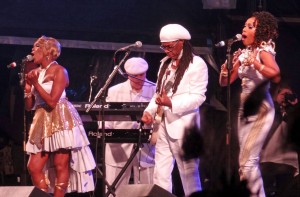 written, produced or performed by Nile Rodgers and his Chic organisation. From the opening ‘Everybody Dance’ to the closing ‘Good Times’ (including a break of ‘Rappers Delight’ for good measure), everybody danced. The complete quality of the music was probably only matched by the sheer incredulity of hearing actually how many hits have had the Rodgers name aligned to them. ‘Let’s Dance’, ‘Like A Virgin’, ‘Lost In Music’, INXS’s ‘Original Sin’ and even Duran Duran’s ‘Notorious’ all have the mark of Rodgers on them. And even when the party stopped it wasn’t fully over. As an ecstatic crowd ebbed away, Daft Punk’s ‘Get Lucky’ boomed out of the West Holts’ PA.
written, produced or performed by Nile Rodgers and his Chic organisation. From the opening ‘Everybody Dance’ to the closing ‘Good Times’ (including a break of ‘Rappers Delight’ for good measure), everybody danced. The complete quality of the music was probably only matched by the sheer incredulity of hearing actually how many hits have had the Rodgers name aligned to them. ‘Let’s Dance’, ‘Like A Virgin’, ‘Lost In Music’, INXS’s ‘Original Sin’ and even Duran Duran’s ‘Notorious’ all have the mark of Rodgers on them. And even when the party stopped it wasn’t fully over. As an ecstatic crowd ebbed away, Daft Punk’s ‘Get Lucky’ boomed out of the West Holts’ PA.
Travelling two days beyond and with hundreds of acts in between, Glastonbury 2013 was brought to the most perfect of ends on the West Holts stage courtesy of the soul legend that most definitely is Bobby Womack. Despite being advised beforehand that we would be getting two Bobby Womacks tonight, we did only get one, albeit split over two very contrasting sets. The first saw him showcasing songs from last year’s The Bravest Man in the Universe, an album produced by Damon Albarn who was on hand tonight to provide piano accompaniment and moral support. Earlier this year Womack had been diagnosed as having Alzheimer’s disease and this coupled to the sight of his initially shambling gait marked him down as someone not in the rudest of health and for whom it raised genuine fears about what might be to come.
But Bobby Womack is a soul survivor. Dressed from head to toe in black leather and initially seated, he first accompanied himself 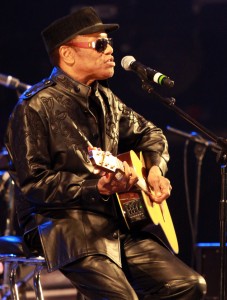 on guitar and soon hit his vocal stride; his command of the material and occasion was truly majestic. Returning for the second set, he had changed into red leather and the entire complexion of his band. Albarn was gone, replaced by horns, backing singers and huge slice of old school funk. Womack by now was on his feet and the man who, significantly given the occasion, was behind The Rolling Stones first ever hit – ‘It’s All Over Now’ – strode triumphantly through the hallowed corridors of his impressive back catalogue. ‘Across 110th Street’, an imperious ‘Harry Hippie’ (complete with astonishing attendant vocal pyrotechnics from Alltrinna Grayson), ‘I Wish He Didn’t Trust Me So Much’ and Sam Cooke’s ‘A Change Is Gonna Come’; they were all present and correct. Womack was true to his word; he did let it all hang out, and it proved to be the most perfect of farewells to the most perfect of festivals.
on guitar and soon hit his vocal stride; his command of the material and occasion was truly majestic. Returning for the second set, he had changed into red leather and the entire complexion of his band. Albarn was gone, replaced by horns, backing singers and huge slice of old school funk. Womack by now was on his feet and the man who, significantly given the occasion, was behind The Rolling Stones first ever hit – ‘It’s All Over Now’ – strode triumphantly through the hallowed corridors of his impressive back catalogue. ‘Across 110th Street’, an imperious ‘Harry Hippie’ (complete with astonishing attendant vocal pyrotechnics from Alltrinna Grayson), ‘I Wish He Didn’t Trust Me So Much’ and Sam Cooke’s ‘A Change Is Gonna Come’; they were all present and correct. Womack was true to his word; he did let it all hang out, and it proved to be the most perfect of farewells to the most perfect of festivals.


